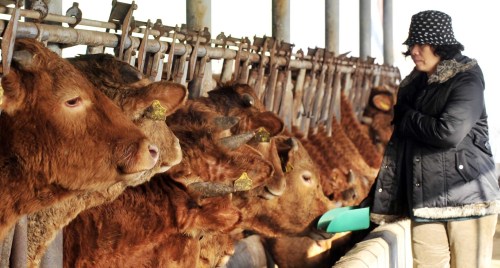Angry farmers protest over cattle price fall, hike of feeding costs
The nation’s cattle breeding farms are being severely hit by the fall in beef cattle prices as a result of an oversupply of homebred cows and by soaring animal feed prices.
Male dairy calves used for veal are being put up for sale at 10,000 won per head, but it is still not easy to find buyers.
A cattle breeder in Sunchang, North Jeolla Province, buried nine cows that starved to death earlier this week as he could no longer afford to feed them.
His debts snowballed to 150 million won ($130,000) as the price of cattle plummeted while the price of fodder skyrocketed.
A great number of local livestock farms jumped into cattle breeding after a widespread furor over mad cow disease in 2008 caused consumers to turn to hanwoo, or Korean beef.
The number of Korean beef cattle soared from 1.4 million in 2001 to 2.92 million in 2009 and has now reached 3.3 million.
The optimum number of homebred beef cattle for a balance in supply and demand in Korea is said to be 2.6 million. The figure passed the optimum level two years ago and has continued to rise sharply.
Consumption of hanwoo plunged in the meantime as cheap imported beef poured in and the outbreak of foot-and-mouth disease early last year quelled demand.
The nation’s cattle breeding farms are being severely hit by the fall in beef cattle prices as a result of an oversupply of homebred cows and by soaring animal feed prices.
Male dairy calves used for veal are being put up for sale at 10,000 won per head, but it is still not easy to find buyers.
A cattle breeder in Sunchang, North Jeolla Province, buried nine cows that starved to death earlier this week as he could no longer afford to feed them.
His debts snowballed to 150 million won ($130,000) as the price of cattle plummeted while the price of fodder skyrocketed.
A great number of local livestock farms jumped into cattle breeding after a widespread furor over mad cow disease in 2008 caused consumers to turn to hanwoo, or Korean beef.
The number of Korean beef cattle soared from 1.4 million in 2001 to 2.92 million in 2009 and has now reached 3.3 million.
The optimum number of homebred beef cattle for a balance in supply and demand in Korea is said to be 2.6 million. The figure passed the optimum level two years ago and has continued to rise sharply.
Consumption of hanwoo plunged in the meantime as cheap imported beef poured in and the outbreak of foot-and-mouth disease early last year quelled demand.

To make matters worse, a hike in international grain prices raised animal feed prices by 16 percent, making cattle breeding a money-losing game.
Raising a calf for two years and selling it now translates into a loss of 1.15 million won. The longer one raises a cow, the more money they lose.
A 600-kilogram homebred cow, which used to be traded at 6.35 million won per head two years ago, is now priced 4.44 million won. The price of a hanwoo calf more than halved from 2.8 million won to 1.29 million won in the two years.
The price of beef in restaurants, however, has not gone down from the level it reached around Chuseok of 2010 thanks to the complicated distribution system.
In North Jeolla Province, 150 grams or a single serving of hanwoo beef is sold for between 22,000 and 40,000 won.
Beef cattle go through at least five stages including cattle markets, butcheries and wholesalers before their meat is sold in restaurants.
A survey in 2010 showed that a hanwoo cow sold at 7 million won in the cattle market was bought for 12 million won by consumers, making distribution costs account for about 40 percent of the beef price.
With cattle sold at much lower rates from the farms now, distribution costs are estimated to take up about a half of beef prices.
All of this had been predicted. The Korean Rural Economic Institute forecast early last year that the number of cattle bred would hit 2.95 million by the year-end, and prices will nosedive. The government, however, stressed market principles and did little more than recommend that farms kill female cows that have given birth.
The Ministry of Agriculture said Wednesday, a day before cattle breeders’ planned protests with their cows, that it agreed with the Defense Ministry to serve soldiers more hanwoo and less imported meat. The ministry also said it will provide incentives of between 300,000 and 500,000 won for farms that slaughter female cows.
Angry farmers rallied nationwide Thursday, calling on the government to come up with measures to reduce the damages, especially after the removal of tariffs on U.S. beef over the next 15 years.
“The government plans to gradually remove the 40 percent tariff on U.S. beef under the Korea-U.S. free trade agreement, but has not laid out any remedies for domestic hanwoo farms,” said the Hanwoo Association, a group of local beef cattle breeders.
Members of the association attempted to take their cows to Cheong Wa Dae for demonstrations Thursday, but were blocked by police from entering the highways.
They are urging the government to buy hanwoo to keep prices from falling further, expand incentives for weeding out female cows and subsidies to purchase animal feed.
By Kim So-hyun (sophie@heraldcorp.com)
-
Articles by Korea Herald



















![[Today’s K-pop] Treasure to publish magazine for debut anniversary](http://res.heraldm.com/phpwas/restmb_idxmake.php?idx=642&simg=/content/image/2024/07/26/20240726050551_0.jpg&u=)